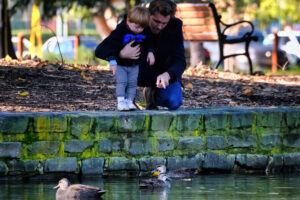Duck, duck, goose … gone from Caulfield Park

Save articles for later
Add articles to your saved list and come back to them any time.
Key points
- Glen Eira City council has removed 15 geese and seven ducks from the lake at Caulfield Park.
- The birds have lived at the park for decades but have taken a “tree change” to a farm in the countryside.
- Glen Eira Mayor Jim McGee said the council removed the birds to ensure their safety and to attract native wildlife.
For decades geese and ducks have lived in the centre of the lake at Caulfield Park in Melbourne’s east, but the birds have been relocated in a bid to attract more native wildlife to the park.
Glen Eira council has moved the 15 geese and seven ducks to a new home at a farm in central Victoria, which the council documented in a “proof of life” video on social media.
Watching the ducks at Caulfield Park lake was a popular pastime.Credit: Luis Ascui
Visiting the lake this week, Sue Hallams and her daughter Phoebe Foldvari were not entirely sad to see the geese gone after a bad experience with the birds when Foldvari was a child.
“When this one [Phoebe] was about two, they did chase after us and I had to scoop her up and run,” Hallams said. “We’ve always been scared of the geese… they just kept chasing us and they were a bit aggressive.”
Hallams said she supported the removal of the birds if it helped attract native wildlife.
“As long as the geese are definitely on a real farm, not the other kind of farm,” she said.
Sue Hallams and her daughter Phoebe Foldvari at Caulfield Park lake, where they were once chased by the geese. Credit: Luis Ascui
Plenty of native ducks remain at the lake alongside flocks of pigeons.
Local resident Ash Baxter said council had not consulted residents on the move and questioned why those particular ducks and geese had been relocated while there were still plenty of other ducks remaining at the lake.
“Why are there other animals that haven’t been relocated?,” she said. “Is that part of a larger plan for the park, because there’s a lot of non-native other animals and also trees. Is that a completely different direction where they’re going to take the entire park native over time? It’s not actually about the ducks, it’s about transparency.”
Glen Eira mayor Jim Magee said the exotic ducks and geese were relocated to safeguard their welfare.
“In 2022, we called animal rescue groups on multiple occasions to rescue geese or ducks following dog attacks,” he said. “Some geese have attacked the offspring of domestic and native ducks during breeding season as they’ve competed for resources.”
Magee said there were more male domestic ducks than female ducks, which could create some “distressing incidents” during breeding season.
Families feeding the ducks and geese were also an issue.
“Despite signs not to feed the birds and a continued presence of park rangers in the area, we couldn’t guarantee the safety of the birds from feeding and dog attacks,” Magee said.
After removing the ducks and geese in March, the council installed aquatic plantings with nets to attract native birds.
“An ecological report late last year found clear evidence the geese and ducks were responsible for overgrazing and erosion of the lakeside grassed area,” Magee said. “We needed to rehome the exotic species of ducks and geese so that native waterfowl and plants can flourish.”
Magee said the birds were thriving in their “tree change” new environment with four dams to explore and room to make their nests in safety.
The council spent $2,530 on relocating and rehoming the ducks and geese to the unnamed farm.
The council has installed plantings to attract native birds. Credit: Luis Ascui
Magee said the ducks and geese had also affected the water quality of the lake in Caulfield Park and negatively impacted the native aquatic species.
He said since the removal of the ducks and geese the water in the lake was noticeably clearer and the turf around the lake was already growing back.
Plans are under way for the removal of more non-native species.
“Carp are being managed to enable existing populations of native freshwater shrimp and mussels to recover and thrive,” Magee said.
The Morning Edition newsletter is our guide to the day’s most important and interesting stories, analysis and insights. Sign up here.
Most Viewed in National
From our partners
Source: Read Full Article



